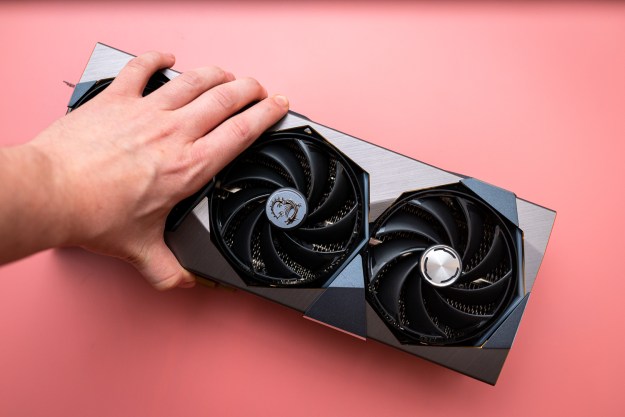Nvidia’s RTX 3080 and 3090 just launched and, for now, don’t have much competition — but that should soon change, as AMD will announce its next-generation Radeon hardware on October 28. AMD teased the performance of its new cards during its Zen 3 processor announcement by showing off three benchmark results.
The results showed Borderlands 3, Call of Duty: Modern Warfare, and Gears 5, all at 4K resolution, and at each game’s maximum quality preset. The results showed Borderlands 3 at an average of 61 frames per second, Call of Duty at 88 frames per second, and Gears 5 at 73 frames per second.
AMD Radeon RX 6000 vs. Nvidia RTX 3080: How does it compare?
These benchmarks are from AMD and are quoted for the “Radeon RX 6000 series.” The Radeon RX 6000 series isn’t an individual video card, but a lineup of cards. Of course, AMD would want to paint the series in the best light, so it’s safe to assume these results are from the fastest card in the upcoming lineup, which will likely be called the Radeon RX 6900XT.

For comparison, I examined several reviews, as well as our testing of Nvidia’s RTX 3080. These show the RTX 3080 Founder’s Edition averages 66 FPS in Borderlands 3 at Badass quality. The RTX 3080 FE averages 91 FPS in Call of Duty: Modern Warfare at Ultra quality. Finally, the RTX 3080 FE averages 81 FPS in Gears 5 at Ultra quality.
In all three cases, the RTX 3080 FE delivers better average performance than what AMD quoted.
There’s a lot we don’t know, and many factors could impact performance, including the configuration of test rigs. Since the benchmarks I examined were based on a variety of test systems, there’s some variance in the results.
Still, it’s safe to assume that if AMD felt it could credibly claim the RX 6000 will beat the RTX 3080 FE, it would, even if that means using an extremely high-end, or unusual, test rig. Instead, AMD has shown it won’t quite match Nvidia on extreme high-end performance.
What does this mean for Radeon RX 6000 performance?
This isn’t a surprise. AMD has struggled to beat Nvidia in top-tier performance for years, so it’d be a shock if AMD suddenly defeated Nvidia. That goes double for this new generation of cards, as Nvidia’s performance improvement is greater (particularly at 4K) than speculated prior to its release.
On the other hand, AMD’s benchmarks bring good news. They indicate that AMD’s best RX 6000 card won’t be far behind what Nvidia’s RX 3080 delivers. It’s reasonable to assume that AMD will position its top-end card below the RTX 3080 in pricing, and perhaps substantially below. AMD’s RX 6900XT could prove more of an RTX 3070 competitor.
The tease also shows the RX 6900XT can hit 60 FPS in most games even at 4K and maximum detail which, of course, is exactly what gamers buying the card will be hoping for.
A 4K/60 FPS card at a lower price than the RTX 3080 could be an attractive proposition, as the RTX 3080 overshoots
We’ll know more on October 28
AMD’s Radeon RX 6000 series tease was only a small glimpse into the performance of its upcoming card. There’s still a lot we don’t know, including the price, the method it’ll use to support ray tracing, and whether AMD will attempt to emulate some of Nvidia’s key features, like DLSS.
Still, the RX 6000 series tease was, I think, effective. While some fans of Team Red might be disappointed to see AMD will again fall behind Nvidia’s best, the results quoted are good enough to keep gamers interested. Depending on price and features, the AMD RX 6900XT still has a shot at Nvidia.
The final details will be revealed during a livestream on October 28, so tune in then for the latest.
Editors' Recommendations
- Here’s how AMD counters Nvidia’s big RTX Super launch
- AMD might crush Nvidia with its laptop GPUs — but it’s silent on the desktop front
- Nvidia did AMD a huge favor by releasing the RTX 4070 Ti
- Nvidia and AMD GPU prices could skyrocket again in 2023. Here’s why
- Gigabyte may have accidentally leaked Nvidia’s plans for the RTX 4080 12GB



